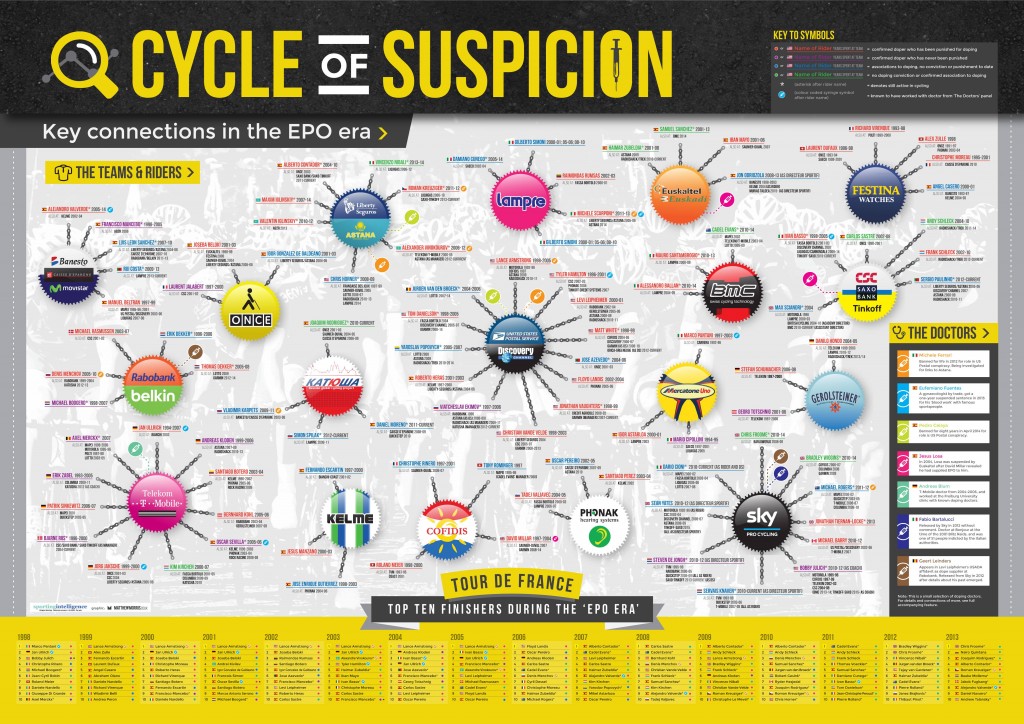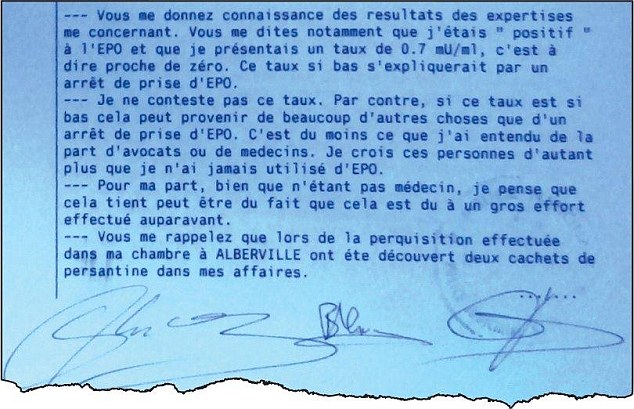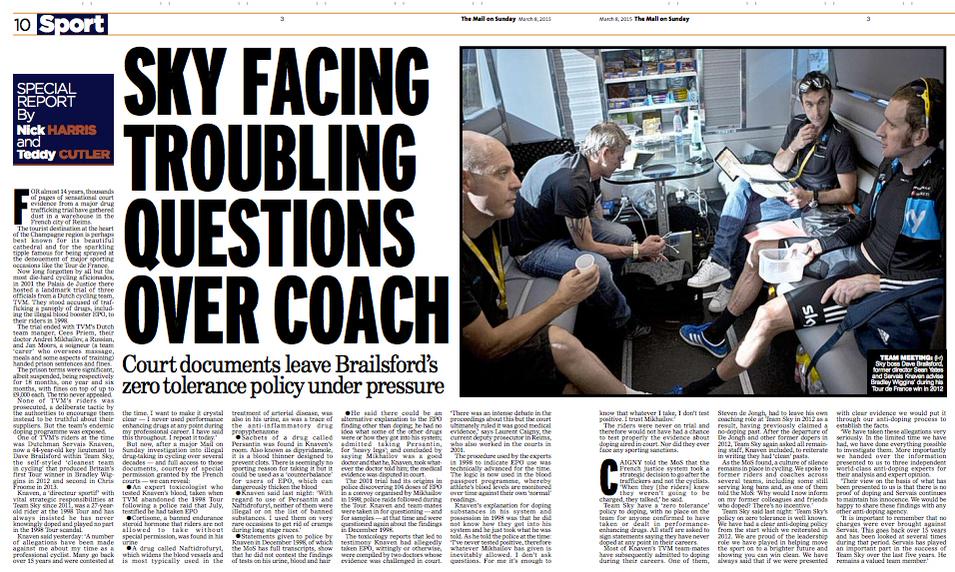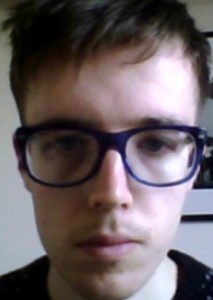.
“Our vision is to continue to play a leadership role in charting a better future for this great sport of ours and
changing the culture that so damaged it. That means continued leadership on anti-doping.”
Sir Dave Brailsford, 2014
.
30 March 2015
It was back in 2012 that Team Sky, home at that time to the defending Tour de France champion Sir Bradley Wiggins, carried out a purge of staff.
In an autumn of the long knives, Bobby Julich and Steven de Jongh left their posts after an exhaustive and, presumably, exhausting interrogation of their doping pasts. Sean Yates left for ‘family reasons’; Michael Rogers and Juan Antonio Flecha both departed at the end of the season.
Julich and De Jongh had taken EPO, cycling’s miracle ‘blood boosting’ drug, in the late 1990s. When Sky reaffirmed and strengthened their ‘zero tolerance’ policy on doping in the wake of the United States Anti-Doping Agency’s ‘Reasoned Decision’ on Lance Armstrong, which saw the seven-times Tour winner stripped of his titles and banned for life, Julich and De Jongh went.
They eventually found work elsewhere – the American at BMC; the Dutchman at Tinkoff-Saxo, where they both now serve important roles, along with Yates and Rogers, who is the ‘road captain’ on that Russian team.
Servais Knaven, a friend and co-rider of De Jongh on the Dutch TVM team when it was thrown from the 1998 Tour after doping products were discovered in their hotel, remained with Sky. He still works with them as sports director.
Sky’s policy, that any doping in the past will mean you can no longer work for them was, and is, laudable … in a utopian world where the past refuses to intrude upon the present and where humans are removed of their ability and innate desire to wriggle and lie.
But as outlined in detail in a review of the so-called ‘EPO era’ in December (summarised visually, below right), a clean break from cycling’s past is impossible and wholly unrealistic.
Professional cycling in 2015 is populated with people who were deeply involved in the EPO era that began in earnest in the mid to late 1990s, either still riding or, more often, serving as team officials.
The Cycling Independent Reform Commission (CIRC) report, commissioned by the UCI, and available here, had a remit that included exploring how the EPO era unfolded, and making recommendations on cycling’s future.
This website’s own review explored, pre-CIRC, some of the areas it might touch upon. That review looked at all major teams, past and present. All riders. All doctors. All team managers. All nationalities.
It did not set out to highlight any one team or group over another. That should be absolutely clear from the briefest perusal of the 12,500 words in that review, and in the poster brilliantly realised by Matt Morris for Sportingintelligence that summarised the findings.
That review, in fact – which over many months gained input from riders and officials, past and present, banned and never sanctioned – laid the groundwork for an investigation published in the Mail on Sunday, over two weeks, here and here.
A full six weeks before the first part was published, Team Sky had declined to answer some fairly rudimentary questions about their own policy. Then as fresh information became available – as well as access to documents never scrutinised or published before*, by any media – the focus intensified on a particular person at Team Sky. But the issues at the heart of it are much wider than any one person.
The issues include the serious flaws and inconsistencies in the ‘zero tolerance’ policy, and a pervasive culture of omertà.
.
———————————————
.
“I took EPO on a few occasions from 1998 to 2000. It was very easy to get hold of and I knew it couldn’t be detected. I was a fairly young rider, the opportunity was there right in front of me and it was a pretty big challenge to stay away from the temptation. There was no pressure at all from my team, the Directors or the Doctors to take it. This was my choice.”
Steven de Jongh, 2012, in an open letter to Team Sky.
.
The issue is not Servais Knaven. Team Sky have employed and almost certainly continue to employ former dopers, plural. They are not limited to De Jongh and Julich, or Geert Leinders and Michael Barry. They know who they are. Team Sky must have a decent idea too. But it is Knaven’s case that highlights a sorry situation.
He co-operated, along with De Jongh and others, with legal authorities in the summer and winter of 1998, as part of proceedings that led to a drug trafficking trial involving TVM team staff Cees Priem, Jan Moors and Dr Andrei Mikhailov – who even now works at the Katusha team.
The case came to an end in May 2001 with convictions for those three men, but with no sporting sanctions for the riders involved.
There were no sporting sanctions, we have been told – in person, by officials who worked on the case at the time – because the prosecutors were far more interested in the facilitators than the beneficiaries.
The nature of these documents, then, was something of a mystery. We knew Jeroen Blijlevens and Bart Voskamp, two of Knaven’s teammates, took EPO, because they confessed in 2014. De Jongh likewise, although his confession came earlier.
But Knaven? There were second-hand newspaper reports in French and Dutch that claimed he was one of the riders to have tested positive for EPO in blood tests taken at an Albertville hospital after TVM were ejected from the 1998 Tour.
Nothing conclusive. And of course, no direct test for EPO was available in 1998.
It only took a telephone call and some email correspondence with a senior official in the Reims courthouse where Knaven, De Jongh and their teammates had come to testify in December 1998 for us to gain access to the case documents, some pictured below.
 At the Palais de Justice in Reims just a few weeks ago we had access to thousands of pages of evidence from the three-year TVM trial. There is detailed scientific evidence there, and contemporary police statements signed in the presence of lawyers. There are test results from blood, urine and hair samples, and reams of legal papers.
At the Palais de Justice in Reims just a few weeks ago we had access to thousands of pages of evidence from the three-year TVM trial. There is detailed scientific evidence there, and contemporary police statements signed in the presence of lawyers. There are test results from blood, urine and hair samples, and reams of legal papers.
Knaven’s name and the names of his TVM team-mates are all over the documents, which tell, often in their own words, what was going on during that disgraced 1998 Tour de France.
A toxicology report concluded Knaven had used EPO, by measuring the level of natural EPO in his body through a ‘negative feedback’ system, the theory being that if you use recombinant (synthetic) EPO then you stop producing the natural stuff.
He admitted, in a police report, to using Persantin, a blood-thinner, but said it was to treat ‘heavy legs’. He had taken Naftidrofuryl, a vasodilator whose medical use is to prevent heart disease and blood circulation problems. Cortisone, a steroid whose use in cycling is illegal without a therapeutic use exemption, was found in his urine. It is unknown whether Knaven had a TUE, because he and Sky have still to answer our questions.
Servais Knaven has always maintained, and continues to maintain to this day, that he never played any part in the TVM doping scandal. The evidence and statements we found – much or which had never been seen before or published by anyone – suggested otherwise.
But this is not about Knaven, who is good at his job and does not, in my opinion, deserve to lose it for indiscretions committed 17 years ago in a very different era. Knaven is simply a symptom of a system that is still broken.
.
———————————————
.
It was apt that as we were returning from Reims with our evidence, the UCI was preparing to release the CIRC report. Three senior officials in law and anti-doping had been beavering away at great expense for over a year, in an attempt to dig up ghosts and in the process wipe professional cycling’s slate clean.
It was a brave effort, even if results were mixed.
Chris Froome, of Sky, was the only named, active rider who spoke to CIRC, which had no mandate to force people into coming forward.
Most revealingly, not one past or present rider who has never admitted to an anti-doping rule violation came forward to volunteer information. No-one like Knaven stepped from the shadows. And with no incentive to, why would they?
The report produced some interesting information, like the revelation by two unnamed sources that from 20 to 90 per cent of the peloton are still doping. But Brian Cookson, the President of the UCI who established the commission, said he would “like to think the figure is closer to 20 per cent than 90.”
That is problematic. Cookson called for the report, and now appears to want to dismiss its findings.
It all adds up to a pervading feeling that very little has changed. Just as in 1998, when TVM and Festina were rumbled, professional cycling is an environment that encourages secrecy.
The CIRC report had the praiseworthy aim of illuminating the recesses of the sport but ended up by showing how dark those recesses remain. If it accomplished one thing, it was to show how powerful a force the omerta remains.
.
———————————————
.
When we returned and presented our evidence to Sky, they questioned Knaven and he gave the same answer he gave back in the autumn of 2012. I never doped. Sky took our evidence to three experts, none of them named, and announced they had concluded there was no proof of doping.
We asked the world’s leading authority on the detection of banned performance-enhancing drug EPO in blood, Robin Parisotto, what he thought. Parisotto invented the first EPO tests, used at the 2000 Olympics. As the pertinent MoS article explained, these tests have morphed into the athlete biological passport and since been adopted by a number of international sporting bodies.
Parisotto also currently sits on the biological passport panel of cycling’s world governing body, the UCI. He said a particularly low level of natural EPO – as found in Knaven’s blood, as agreed was found in his blood by Knaven himself at the time – is explicable only by renal damage or doping.
This is the tipping-point at which what should be a laudable attempt at transparency slips uncomfortably into obfuscation.
Knaven said in 1998 that he had never taken Naftidrofuryl. Now he admits that he did. Knaven admitted in 1998 that he was happy to take whatever Mikhailov gave him, and that everything was allowed ‘as long as what Mikhailov gives me doesn’t make me test positive’.
Knaven said in a police statement on 3 December 1998 (right) that he did not contest the abnormally low level of natural EPO in his body but that there could be ‘numerous other reasons’ to explain it other than having recently stopped a course of synthetic EPO.
Not one of these other reasons has yet been forthcoming. We would, obviously, be more than happy to hear one. We asked questions of Knaven and other current Team Sky staff a full six weeks before ever going to Reims.
Sky’s policy was to answer nothing, put up nobody.
After publication of the first story of the investigation in the MoS, in an interview with The Telegraph’s Cycling Podcast (linked here), Brailsford said: “Unfortunately there is nothing concrete…that says to us this is undeniable. Whilst he [Knaven] maintains that position and without anything absolute to the contrary we have to take him at his word.”
Sky have repeatedly declined to answer general questions we have posed relating to the team and the zero tolerance policy, as well as fresh ones to have resulted from the evidence we uncovered in Reims.
It’s easy to see where this obfuscation originates from. Zero tolerance is impractical – unworkable, even – in an era still so closely wedded to cycling’s EPO generation.
The situation Sky find themselves in now is deeply uncomfortable. They have questioned Knaven twice over his time at TVM. They now know that he has withheld certain key information from them.
Yet they cannot sack him, because he will not confess, and, from their point of view, there is no proof. (Nor, it should be stressed, again, do I think Knaven should be sacked).
It is to be hoped Sky don’t take what would be, ultimately, the most cynical option of all: to quietly release Knaven at the end of the season, when the hubbub has died down and they can avoid any more difficult questions. If they do, this sentence will stand as a record, and prediction, of their artifice.
All of this leads to the inevitable question: what, really, is the point of zero tolerance?
Is it really a policy to ensure that not a single figure on the team has ever had an association with doping?
Or is it, as it appears, a policy that seeks to give the impression nobody on the team has ever doped?
There is an obvious gulf between those two positions.
The latter option is where zero tolerance and the failure of CIRC intercept. Both end up in a dangerous hinterland, and in fact reinforce a dangerous culture of secrecy.
There are still figures working at Sky who the team must be confident were involved in or saw doping offences being committed in the past. Now, thanks to the treatment of Knaven, these figures know that silence is golden, just as it was for those who declined to speak to CIRC.
The response to the MoS reports, and the CIRC report, were telling.
Geraint Thomas, Sky’s form rider of the year so far, described the suggestion that 90 per cent of the peloton are still doping as “insulting”. Most in cycling simply met its release with silence. Former Sky sprinter Mark Cavendish has said there is “nothing new” in the CIRC report and that he was “unaware” riders could approach the Commission.
The MoS story was mentioned, much to his credit, by Matt Dickinson of The Times. Tom Cary in The Telegraph also referenced it. Every other major British newspaper ignored it. (Well, I say ignored it; several cycling correspondents got in touch privately to say, and I paraphrase: ‘Interesting work, but it’s tough to follow-up without pissing off Sky’).
Are we living through another era where everyone knows the truth, but few have the guts to acknowledge it? Sky exert a considerable influence in the British sporting media – all the more laudable, then, that The Times even acknowledged the Knaven story.
The irony is that nobody set out to ‘get Sky’.
Astana, for instance, deserve far more scrutiny on a regular basis than Sky do. So too Katusha; why, for instance, is Mikhailov still a doctor at a professional cycling team in 2015, despite having a criminal conviction for assisting doping, a criminal conviction never appealed?
But if asked that question, Katusha owner Igor Makarov would simply shrug his shoulders and move you on – he’s under no obligation not to employ those with a doping past.
Sky’s policy, on the other hand, leaves them open to accusations of rank hypocrisy, and, perhaps worse, a lack of transparency, because of those who are gone, and those who have been left behind at the team.
Zero tolerance, as I see it, is not an anti-doping policy. It’s one that drives dopers and their lies further underground; that backs them into a corner where it’s the truth or your job on the line.
I absolutely get it that reasonable observers might think it churlish to have gone digging so far back into someone’s past, whether that was Knaven, any of this team-mates, or any of the other figures in our cycle of suspicion.
What Knaven and others do now in their roles at Sky or elsewhere should not be defined by what they did or did not do in the past – and it is worth reiterating that in 2015 he maintains his innocence.
Knaven should be free to pursue his post-riding career free from suspicion. He would be doing so now, were it not for zero tolerance.
If Sky had a policy like the one Jonathan Vaughters employs at Cannondale-Garmin of being open about the sins of the past, the trip to Reims would have become an exercise in stating the obvious.
 ‘Hey Dave, look at all the evidence we have collected that shows Servais Knaven used blood-thinners and vasodilators suitable for 70-year-olds with heart conditions’, we would have said.
‘Hey Dave, look at all the evidence we have collected that shows Servais Knaven used blood-thinners and vasodilators suitable for 70-year-olds with heart conditions’, we would have said.
And Brailsford would have turned around and told us methodically that none of that mattered a jot, because in 1998 there was an entrenched culture of doping in cycling, and that we should all – journalists included – jolly well move on by acknowledging rather than demonising that culture.
“F*** protecting our image,” said Vaughters in 2013, after Ryder Hesjedal admitted to using EPO during his mountain-biking career. “Let’s actually do the right thing.”
It seems to me that at Sky, image protection comes first. Which makes it all the more ironic that zero tolerance has the ticking timebomb ability to dent that image.
Across the world of professional cycling, the battle between the past and the present continues. Only yesterday, Bjarne Riis left his post as manager of Tinkoff-Saxo by “mutual consent” after disagreements over the way the team is run.
Tinkoff-Saxo have no zero tolerance policy, as is clear from the presence of Julich and De Jongh as staff. Riis has already admitted to doping for his Tour de France victory in 1996. Still, the ghosts of the past will not lie down.
No-one is saying this is an easy issue to deal with. It’s incredibly complex both morally and legally. We tried to explore – in the context of a sport as a whole – what Sky’s flagship policy actually means.
The results of our investigation should make anyone interested and with a vested interest in professional cycling deeply uneasy.
Zero tolerance leaves us further than ever from the truth, and leads us back to the quote from the start of this piece.
Are Sky “changing the culture that so damaged” cycling? In some ways – nutrition, training, ‘marginal gains’ – yes.
But as our investigation revealed, they are not really interested in doing their background checks into the individuals who participated in that damaging culture.
And when evidence pops up, like the documents we presented, that incriminates those individuals, they have an extreme black-and-white policy in place that encourages inconsistency and, perhaps, lies.
And are they “leaders on anti-doping?”
Not until they draw a line under the past and embrace the concept of honesty.
Until then, their efforts are all so much spin. And men like Servais Knaven will continue to suffer the uncomfortable whispers of the past.
.
Follow Teddy Cutler on Twitter







